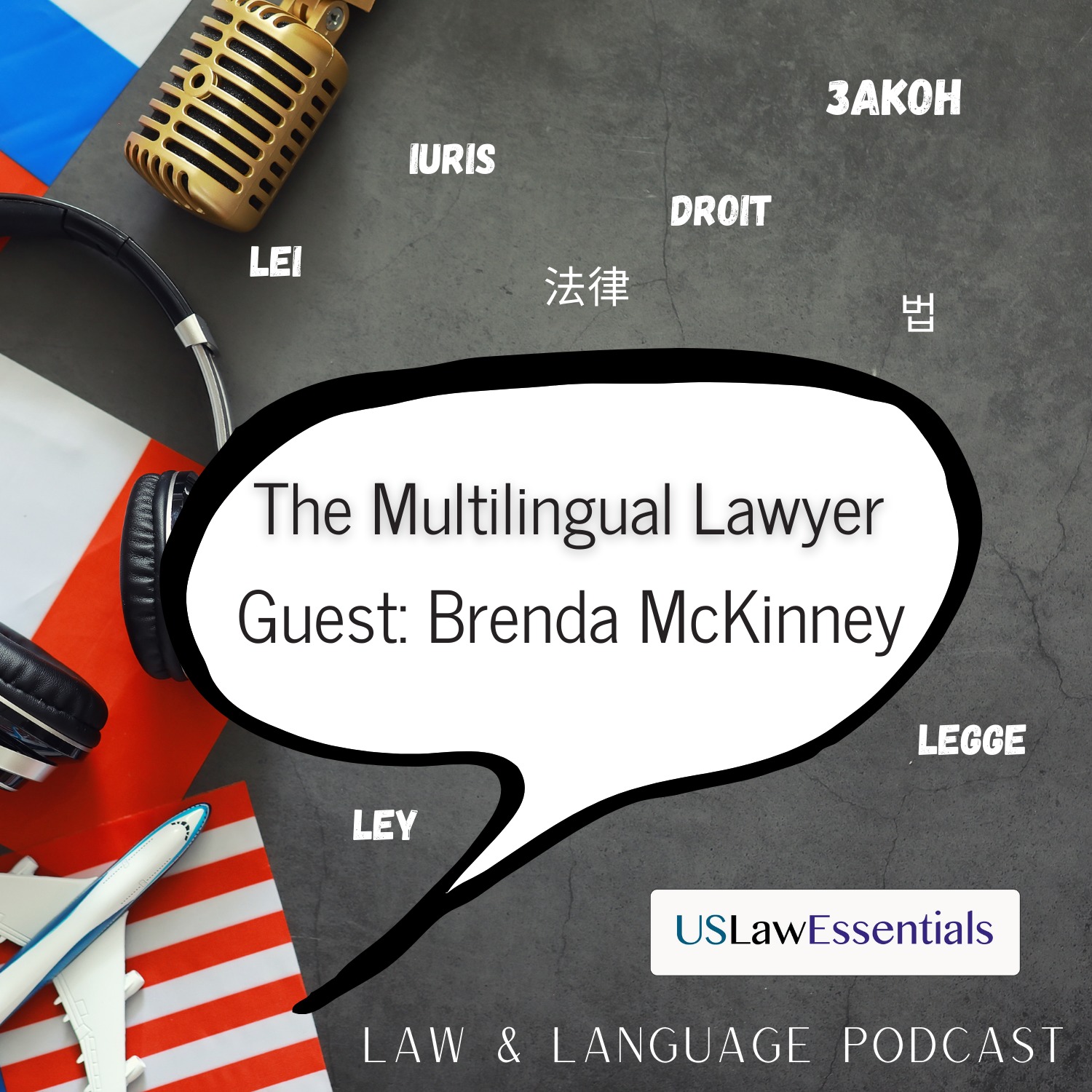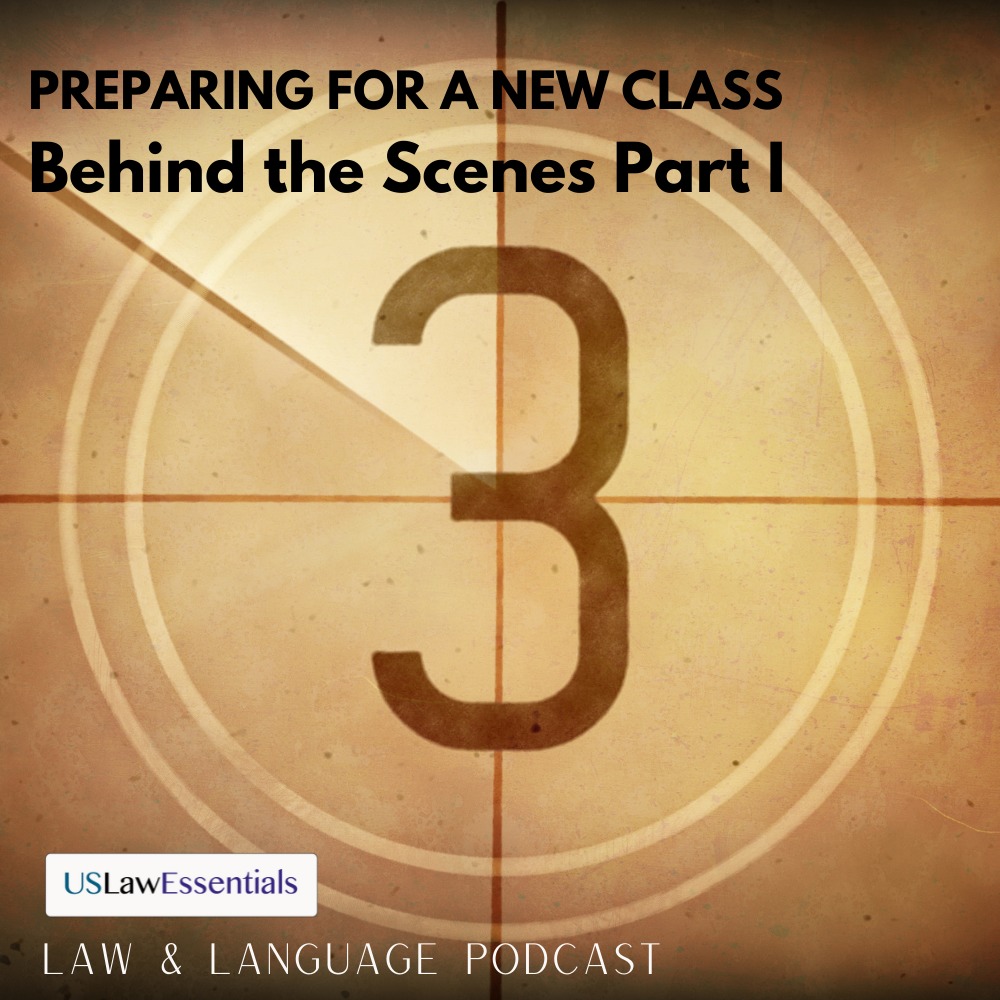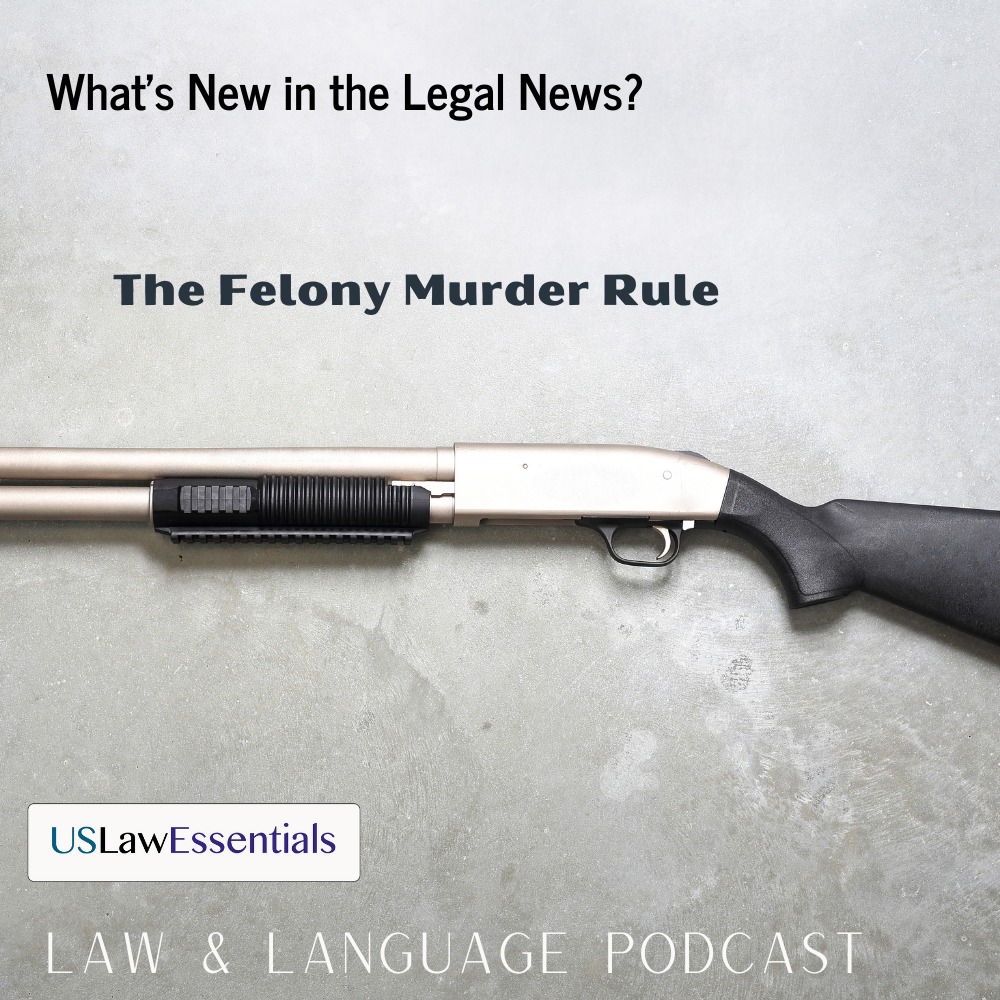Episode Transcript
Speaker 0 00:00:00 Welcome to the us law essentials law and language podcast, the legal English podcast for non-native English speakers that helps you improve your English, listening, improve your legal English vocabulary and build your knowledge of American legal culture.
Speaker 1 00:00:18 Before we begin today's episode, I wanted to remind you that us law essentials offers online legal English, and online us law courses. Our courses are designed for students bar exam candidates, attorneys, and translators. If you are interested in learning more, please contact Daniel at Daniel, us law, essentials.com or visit us law essentials.com and join us on LinkedIn and Facebook. And now today's episode.
Speaker 2 00:00:52 Welcome to the us law essentials law and language podcast. I'm Daniel Edelson
Speaker 3 00:00:56 And I'm Steven Horowitz.
Speaker 2 00:00:58 And today we are continuing our what's new in the legal news series. And today it is Steve's turn, but Steve,
Speaker 3 00:01:06 Yeah,
Speaker 2 00:01:07 You gotta help me.
Speaker 3 00:01:08 What's going on Dan?
Speaker 2 00:01:10 Well, you know how there's a YouTube channel, the us law Central's YouTube channel, which has all sorts of explanations of different us legal topics.
Speaker 3 00:01:19 I've heard something about it. Yes.
Speaker 2 00:01:21 Excellent. Well, I thought everybody heard about it. Well, yesterday and the day before I had more than a thousand people visiting just one, one video on hearsay,
Speaker 3 00:01:36 Hear what?
Speaker 2 00:01:38 Right? Hearsay and all the comments had were very similar. All the comments were saying, Johnny Depp brought me here,
Speaker 3 00:01:53 Actor, the actor brought them to your, to the, to the us law essentials video.
Speaker 2 00:01:57 Yeah. And I don't get it. Steve, how is it possible that Johnny de the actor would be bringing all these people to a us law essentials video?
Speaker 3 00:02:08 Well, this is gonna sound like a crazy coincidence, Dan, but I've got a topic for what's new in the legal news today. That's gonna, I think, uh, hit this right on the head. And that is that, um, there's a, a, a defamation lawsuit going on right now between Johnny Depp, the famous actor and his wife, former wife, Amber herd. Who's also a famous actress. And so there's a lot of coverage in the news right now about this trial. Um, have you heard anything about this, Dan?
Speaker 2 00:02:40 No. And which makes me really, really happy that, um, that I'm tuning in today. Cuz I think I'm gonna finally get an answer.
Speaker 3 00:02:47 Well, uh, here here's, what's going on and it's, it's a little confusing because we're gonna be dealing with the term hearsay. And then one of the party's names in this lawsuit is Amber herd, which is past tense of here. Um, and then I asked you if you've heard about this. So this is all potentially getting a little confusing, but that's great because hearsay is also a confusing topic for most people.
Speaker 2 00:03:09 Okay. Well, while speaking of hearsay, I'm just going to listen, so, okay. I'll keep this in mind. So explain what's going on here.
Speaker 3 00:03:17 Okay. You hear and I'll do the saying, I'll say, okay. So in this lawsuit, um, they're doing cross examination right now and, and Johnny Depp is being asked questions by the lawyers for Amber herd. And one of the running themes of these questions is that when he starts telling what happened in his own words, the lawyer, uh, for Amber herd frequently, um, says, objection, hearsay.
Speaker 2 00:03:48 Aha. So now I get it. Now I understand there's a trial involving a famous person or maybe two famous people. And when Johnny Depp is being asked to give testimony in court, the other lawyer says, objection, that's hearsay. Objection. What does that mean?
Speaker 3 00:04:13 Well, that means that the lawyer is telling the judge that this person on the stand is saying something that should not be allowed as evidence or something. That's not proper. Maybe they don't want the jury to hear this.
Speaker 2 00:04:27 Okay. So, um, an objection is like a protest, right? So the lawyer for the other side is saying, you're breaking the rules. He's not allowed to answer this question because it's hearsay.
Speaker 3 00:04:42 Correct. So in this case, um, what Johnny and, and there's one moment even where Johnny Depp, he gets so used to the, the objections for hearsay that he actually corrects himself on the stand. He stops himself. He says something, he stops himself. And then he says that would be hearsay. Right? And then, and then everybody in the court laughs and then he says, I'm learning. And the statement he made was he asks her what she would like for him to cook. So that was what Johnny Depp said. And then he pauses and he says that's hearsay. Oh, and everybody laughs. So, so he, he asks her what she would like for him to cook. That seems like a pretty innocuous, you know, benign. Not, not terrible statement I to me, but, but let's talk about hearsay maybe.
Speaker 2 00:05:35 Sure. Okay. So Steve, are you ready?
Speaker 3 00:05:40 I'm ready
Speaker 2 00:05:42 Now that you've studied hearsay in law school and through following Johnny Depp, what is hearsay?
Speaker 3 00:05:51 Hearsay is any statement offered in court said by another person to prove the matter at hand? No, I don't have that. Right? What? You, you should be saying this Dan, not me. I don't know what
Speaker 2 00:06:12 He saying. Okay.
Speaker 3 00:06:13 No, I was doing terrible. No,
Speaker 2 00:06:14 No. Steve, this is all about support, Johnny. Jeff, be proud of you. Okay. Are you ready? Steve hearsay is an out of court statement being offered into evidence in court to prove the truth of the matter asserted.
Speaker 3 00:06:34 So wait, let's break that down. So hearsay is an out of court statement. So for example, somebody else somewhere said something, right? And it's being, what's the second part. It's an out of court statement.
Speaker 2 00:06:50 That's that you're offering into evidence. So you're offering into evidence. So it's being brought into court so the jury can hear it.
Speaker 3 00:06:58 Ah, so this is where it gets tricky because in the us legal system, evidence is a big deal because we have a jury system. So a lot of the legal system, a lot of the procedures in court and in a trial are set up to almost protect the jury from hearing things that we don't think the jury should hear.
Speaker 2 00:07:20 Right. I mean, I, I assume that this would be the case, even if it was a judge deciding, um, who would prevail or not, but right. There's there's rules of evidence, which prohibit certain things from being heard in court.
Speaker 3 00:07:36 Yeah. I mean, in other, in other countries, in other legal systems, they don't worry so much about hearsay because the assumption is that a, a professional judge who does this all the time can make the distinction between what's hearsay and what's not, and, and figure out how to value its credibility. However, in the us legal system, we only want evidence in that, that we think is appropriate to be included because to some extent we don't trust a jury to make all of those evaluations.
Speaker 2 00:08:07 Right. Okay. That's interesting. Steve. So now that, so we have an so far, it's an out of court statement. It's being offered into evidence at trial and it's being offered to prove the truth of the matter asserted.
Speaker 3 00:08:25 Yeah. That, that seems like a, the prove the truth of the matter asserted. So one side or the speaker or the witness is saying, this is the truth and they're using, it sounds like they're using an out of court statement to help them support the point that they're trying to make. Would that be a, an accurate explanation?
Speaker 2 00:08:50 I think so. But it's more specifically to prove that, that the, that the out of court statement itself is true. So when I try to explain this to, to students, what I, what I note for them is we do this all the time in our lives. We often sometimes repeat what someone says, just so we know that the person has said that, but we also sometimes repeat things because we want someone to believe that it's true. And those are two different situations.
Speaker 3 00:09:23 Can you give an example, Dan?
Speaker 2 00:09:25 Okay, well, let's say this. Let's say you had a, uh, a boy named Joe and he had a best friend David so far, so good. Good. All right. And Joe really likes this girl, Mary so far, so good.
Speaker 3 00:09:43 Sounds good.
Speaker 2 00:09:45 But Joe's shy.
Speaker 3 00:09:47 Okay.
Speaker 2 00:09:48 So he asks David to go up to Mary and ask Mary if she would like to have dinner with Joe.
Speaker 3 00:10:01 So Joe wants to have dinner with Mary, but he asks David to go to Mary and say, would you like to have dinner with Joe?
Speaker 2 00:10:08 Right. Okay. You following the story so far?
Speaker 3 00:10:12 Yeah. Where, which role does Johnny Depp play in this? Oh, I guess we're not, I don't know. We don't know yet. Okay.
Speaker 2 00:10:16 We didn't yet. Um, I'm just scripting this, but I'm sure he'll be interested. All right. So David goes up to Mary and says, hi, Mary. You know, I was just talking to my friend, Joe, and then Mary interrupts and says, Ew, your friends with, Ooh, you're friends with Joe. He's the most disgusting person on the planet.
Speaker 3 00:10:38 Wow. That's harsh. Yeah. This does sound like the Johnny Depp. Amber heard trial. I've heard, it's getting pretty messy in there.
Speaker 2 00:10:45 <laugh> so David, of course doesn't continue the conversation. He says, okay, well, good chatting with you. And he goes back to Joe. And then Joe says to David, what did Mary say? I'd really like to know, because I wanna, I wanna pick a great restaurant for us. And David says, oh, you know, I was talking to Mary, but she seemed really busy. And, and Joe says, no, no, no. What did Mary say? I gotta know, because I'm really looking forward to this date with her. I bet she's really gonna like me. And then David says, stop Joe. She said you were the most disgusting person in the world.
Speaker 3 00:11:24 Ouch,
Speaker 2 00:11:25 Ouch. But now Steve, here it comes. Okay. Joe and David are friends. So did David tell Joe that Mary said he was the most disgusting person in the world because David wants Joe to believe that that it's true. That he's the most disgusting person in the world.
Speaker 3 00:11:49 No, no. David doesn't think that Joe's the most disgusting in the world.
Speaker 2 00:11:54 Yeah. And he doesn't want Joe to think he's the most disgusting person in the world, but what does he want Joe to know?
Speaker 3 00:11:59 He wants Joe to know that that Mary does not wanna go to dinner with him.
Speaker 2 00:12:06 Right. He just wants, he just wants Joe to know that this is what Mary said when I started talking to her. So I didn't bring up the whole dinner. You're not gonna go on a date with her, just forget it and move on with your life. OK. So that was, that's an example of a statement that's not being offered for the truth of the matter asserted. David just wants his friend to know that Mary said this, it's not true, but that's what Mary said. So she's not gonna go on a date with you.
Speaker 3 00:12:37 So in that instance is Mary's statement, would that be hearsay?
Speaker 2 00:12:44 It would not be hearsay because it was an out of court statement, but it's not being offered for the truth of the matter asserted. We just wanna know that this person said that.
Speaker 3 00:12:53 Uh, so though, so if Johnny Depp said something like that in court, that would be okay.
Speaker 2 00:12:58 I don't know. It depends on the circumstances. Yeah. But so long as he says something, like she said, she said that, so, and so was the most disgusting person in the world. It would be okay if he's not trying to prove that. So, and so is the most disgusting person.
Speaker 3 00:13:12 So Dan, that was a really helpful explanation. And yet I still find myself getting confused as I listen. And I think it's because hearsay has, um, some inherently complicated language, um, features in it. Um, specifically when we're talking about hearsay, we're talking about something that somebody else said, which means we're using reported speech.
Speaker 2 00:13:38 Oh wait, you said reported speech.
Speaker 3 00:13:41 Yeah. Like a reporter, like we're, we're reporting what somebody else said. So anytime you say he said that she said, or even he said that that's reported speech and, and that's in terms of, of grammar. That's like that's using an embedded clause. Um, and that's makes things more complicated to follow. Um, and the other, the other tricky part about it is we're using, um, reference. Do you know what a reference reference is? Yeah.
Speaker 2 00:14:14 A reference
Speaker 3 00:14:15 A referent. Yeah.
Speaker 2 00:14:17 Oh, okay. Not, not like a reference. Oh, a referent. What's a referent.
Speaker 3 00:14:20 Yeah. R E F E R E N T. And then to make it plural at an S so reference that's different than R E F E R E N C E a reference to something. So they're related obviously, but a reference means like a pronoun or a word that we use to hold the place for another, meaning a, a, a word that's like a substitute for the actual thing. And in this case, there's a lot of he and she, in other words, a lot of, he said, she said, which is exactly what Johnny Depp, Amber herd trial is about and why it's so, uh, interesting and exciting for people to, to follow it.
Speaker 2 00:15:01 Thanks, Steve. That's really helpful. That really explains why a lot of hearsay issues can become complicated.
Speaker 3 00:15:08 Yeah. Yeah. And, and, and thanks for the compliment. I guess I'll have to tell my wife about this.
Speaker 2 00:15:14 Well, it is, um, it is, it is hearsay. So
Speaker 3 00:15:17 Wait, if I tell my wife that you said that I was helpful, or that I said that you said that I was helpful, that's hearsay.
Speaker 2 00:15:26 It would be if you want her to think that it's true. That you're helpful.
Speaker 3 00:15:32 I am so lost. I'm gonna have to listen to this episode again, just to understand what I'm talking about.
Speaker 2 00:15:36 Okay. Well, I, I'm gonna go watch, uh, pirate of the Caribbean or some other Johnny. Thanks very much. Steve, stay essential,
Speaker 3 00:15:43 Stay essential, Dan.


